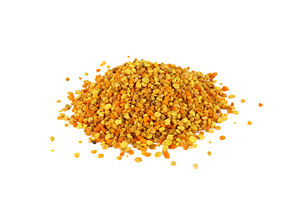Bee Pollen
| See Also | Food Supplements |
|---|
Bee pollen is obtained from the male germ cell of flowering plants. Bee pollen is carried by bees from flower to flower to help fertilize the female germ cell. This action performed by honeybees is essential for the reproduction of much of the world's grains, fruits, vegetables, and legumes. This pollen is brought back to the hive where bees add nectar and enzymes to it. The research on bee pollen is limited. Some studies have shown that it promotes growth and development, protects against free radical and oxidative damage, and protects against the harmful effects of radiation and toxic exposure to chemicals.[1]
Uses
The following is a list of the primary uses for bee pollen.[1]
- Allergies
- Antioxidant support
- Energy enhancement:
- Menopausal symptoms
- Support for chemotherapy and radiation therapy
Prescribing Considerations
The only recommended dosage that has been established is for adults at 1 - 1.5g daily in divided doses. To determine what your specific requirements are talk to your naturopathic doctor or other trained medical professional.
- Bee pollen is available in capsules, chewable tablets, granules, liquid, powder, and tablet forms.
Safety
Bee Pollen is generally regarded as safe for most individuals. Some safety guidelines include:
- General Adverse Effects
- Allergic reaction is the most common side effect. Bee products should be avoided if one has a known allergy to conifer and poplar trees. Signs and symptoms of reaction may range from mild gastrointestinal upset to severe asthma and anaphylactic shock, intestinal bleeding, or even death.
- Drug Interactions
- No drug interactions are known.[1]
References
- ↑ 1.0 1.1 1.2 Pizzorno Joseph E, Murray Michael T (1999) Textbook of Natural Medicine, Elsevier.
